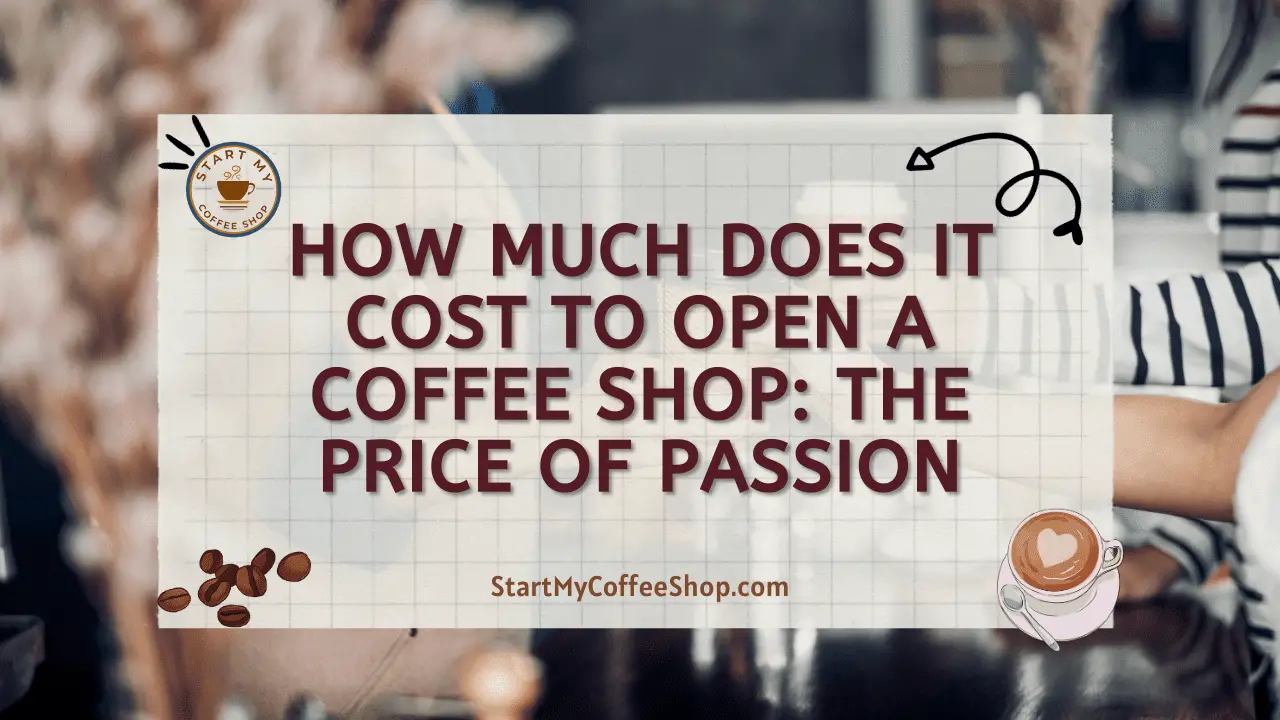Coffee shops have become an integral part of our daily lives, offering a warm and welcoming space to enjoy a cup of joe and connect with others. If you’ve ever dreamt of opening your coffee shop, it’s essential to understand the financial implications involved.
Opening a coffee shop involves various expenses like real estate, equipment, permits, staffing, inventory, marketing, and operational expenses. By understanding these costs upfront and creating a comprehensive budget, you’ll be better equipped to bring your dream of owning a coffee shop to life.
In this article, I will explore the various costs associated with starting a coffee shop, allowing you to plan and budget effectively for your entrepreneurial endeavor.
Location
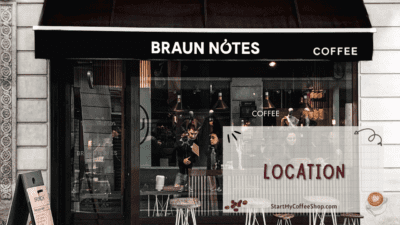
Selecting the optimal location for your coffee shop is a critical decision that can significantly impact your business’s improvement. The cost of renting or purchasing a space will largely depend on the area and neighborhood you choose.
In bustling urban centers, prime locations with high foot traffic and visibility often come with a higher price tag. On the other hand, smaller towns or suburbs may offer more affordable options for aspiring coffee shop owners.
When considering potential locations, it’s essential to evaluate the foot traffic in the area. Look for areas with a steady stream of pedestrians, such as busy streets, shopping districts, or commercial centers. These areas can attract a larger customer base and increase the chances of your coffee shop being noticed by passersby.
Additionally, take into account the nearby businesses in the vicinity. Are there complementary establishments like offices, schools, or retail stores that can attract potential customers? Being situated near establishments that align with your target market can contribute to the overall viability of your coffee shop.
Understanding the demographic of the area is also crucial. Research the local population, their preferences, and the demand for specialty coffee.
Read more about: Strategic Business Plan for Coffee Shop: A Caffeinated Strategy
Real Estate Expenses
After finalizing the ideal location for your coffee shop, it’s time to delve into the costs associated with acquiring or leasing the space. If you opt to purchase a property, there are several one-time expenses to consider.
These include the down payment, which is typically a percentage of the property’s value, and legal fees for handling the purchase agreement and related documentation. Additionally, you may need to allocate funds for renovations and modifications to transform the space into a suitable coffee shop. This could involve installing plumbing and electrical systems, building a counter or bar area, and creating a comfortable seating arrangement.
On the other hand, leasing a property entails different financial considerations. You’ll need to provide a security deposit upfront, which is typically a specified amount equal to a few months’ rent. In addition to the security deposit, there will be ongoing monthly rent payments.
Some commercial leases may also include a percentage of sales clause, where you pay a portion of your revenue as an additional cost. This arrangement is typical in prime locations with high foot traffic.
Your financial condition and long-term objectives will ultimately determine which option is best for you. Both buying and leasing offer advantages and disadvantages. Purchasing offers the advantage of building equity and having more control over the property, but it requires a larger upfront investment.
Leasing, on the other hand, provides more flexibility and may be more affordable in the short term, but it lacks the long-term benefits of property ownership.
Before making a decision, carefully evaluate your financial capabilities and consider consulting with a real estate professional or legal expert to ensure you understand all the associated costs and implications. By thoroughly considering the financial aspects of acquiring or leasing the space, you can make an informed choice that aligns with your budget and business objectives.
Equipment and Furnishings
Equipping your coffee shop with the right machinery and furnishings is crucial for providing a high-quality experience to your customers. The key items you’ll need to budget for include commercial-grade espresso machines, grinders, blenders, refrigerators, display cases, seating, tables, and a reliable Point of Sale (POS) system.
The centerpiece of any coffee shop is the espresso machine, which allows you to craft rich and flavorful beverages. Investing in a commercial-grade machine ensures durability and consistency in the extraction process, resulting in a superior cup of coffee. Similarly, a high-quality grinder is essential for achieving the perfect grind size to extract the best flavors from your coffee beans.
Other equipment, such as blenders for making specialty drinks, refrigerators for storing perishables, and display cases for showcasing pastries and snacks, also play a crucial role in your coffee shop’s operations.
In addition to machinery, furnishing your space with comfortable seating and appealing tables creates a welcoming ambiance for your customers. The layout and design of your seating area should be both aesthetically pleasing and functional, allowing customers to relax and enjoy their beverages.
Investing in a reliable POS system is vital for smooth transactions, accurate inventory management, and efficient order processing. A robust POS system will enable you to track sales, manage customer orders, and analyze data to make informed business decisions.
While the cost of equipment and furnishings can be substantial, it’s essential to prioritize quality and longevity. Cutting corners may lead to frequent repairs or replacements, impacting your business’s efficiency and reputation. Research reputable suppliers, compare prices, and consider both upfront costs and long-term value when budgeting for equipment.
Permits and Licenses
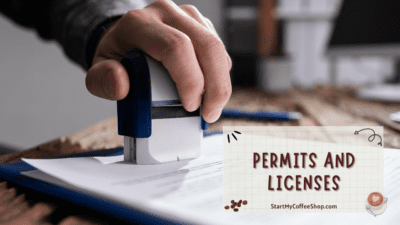
When opening a coffee shop, it’s crucial to navigate the realm of permits and licenses to ensure legal compliance. The specific requirements can vary depending on your location and the governing authorities. Common permits and licenses include health permits, business licenses, food handling certificates, and zoning permits.
Health permits are necessary to demonstrate that your coffee shop meets the required hygiene and safety standards. These permits typically involve inspections of your premises, equipment, and food handling practices.
Obtaining a business license is essential as it legally authorizes your coffee shop to operate in a specific jurisdiction. The process may involve providing documentation such as business registration, proof of ownership or lease agreement, and payment of the associated fees.
Food handling certificates are often required for establishments that serve prepared food or beverages. These certificates ensure that you and your staff have received proper training in safe food handling practices.
Zoning permits are necessary to verify that your coffee shop is situated in a location designated for commercial use. Local zoning regulations govern where businesses can operate, ensuring compatibility with the surrounding area.
Read more about: Startup Costs for a Coffee Shop: The Financial Aroma
Staffing and Training
Hiring and training the right individuals is crucial for providing exceptional service and maintaining a positive reputation. When budgeting for your coffee shop, it’s essential to consider the costs associated with staffing.
The primary positions to consider are baristas, kitchen staff, and potentially a manager to oversee operations. Wages will form a significant portion of your staffing expenses, so research the prevailing rates in your area to ensure competitive compensation. Additionally, be mindful of payroll taxes and contributions towards employee benefits, such as health insurance or retirement plans.
Investing in proper training for your staff is vital to ensure consistency and quality in the beverages and food you serve. This may involve conducting in-house training programs or hiring external trainers with expertise in coffee preparation techniques and customer service.
Creating a positive work environment is also crucial for attracting and retaining talented employees. Consider providing perks and incentives such as employee discounts, flexible schedules, or opportunities for growth within the company. Happy and motivated staff members contribute to a welcoming atmosphere and satisfied customers.
Factor in the costs of recruitment, hiring processes, and any ongoing training or professional development programs you may implement. It’s important to regularly review and adjust your staffing expenses to maintain a balance between quality and cost-effectiveness.
Inventory and Supplies
One of the key aspects of running a great coffee shop is stocking it with premium coffee beans, teas, syrups, milk, pastries, and other essential supplies. To ensure consistent quality, establish relationships with reputable suppliers who can provide the ingredients you need.
Keep in mind the recurring costs of replenishing your inventory, and carefully manage your ordering to strike a balance between offering a diverse menu and minimizing waste. By optimizing your inventory management, you can maximize profitability while still providing a wide range of options for your customers to enjoy.
Marketing and Branding
Effective promotion is vital for the progress of your coffee shop, as it helps attract and retain customers. It’s important to allocate a portion of your budget to various marketing activities that can enhance your visibility and brand recognition.
Investing in signage is crucial for creating a strong presence and attracting passersby. Eye-catching signs that showcase your brand name, logo, and offerings can pique curiosity and draw customers into your coffee shop.
Developing a well-designed website is also essential in today’s digital age. A user-friendly website can provide information about your coffee shop, menu, location, and contact details. Consider incorporating online ordering capabilities or a blog to engage with your audience and build a community around your brand.
Leverage social media platforms to connect with your target audience. Engage in meaningful conversations, share appealing visuals of your beverages and ambiance, and run promotional campaigns or contests to generate buzz and increase your online presence.
Local advertising in newspapers, magazines, or on radio can help raise awareness within your community. Consider sponsoring local events or collaborating with other businesses to expand your reach and tap into new customer segments.
Building a strong brand identity is key to differentiating your coffee shop from competitors. Define your unique selling points, develop a consistent visual identity, and cultivate a brand voice that resonates with your target audience.
Utilities and Operational Expenses
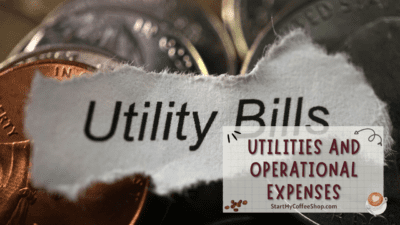
In addition to the upfront expenses, it’s important to consider the operational costs that are essential for running a coffee shop smoothly. These costs include utilities such as electricity, water, and gas, which are necessary to power your equipment and provide a comfortable environment for your customers.
Ongoing expenses like insurance coverage, cleaning supplies, and equipment maintenance should also be accounted for in your budget. By factoring in these recurring costs, you can ensure that you clearly understand the financial requirements involved in the day-to-day operations of your coffee shop and avoid any surprises that may impact your profitability.
Read more about: Start-up Costs for Coffee Shop: Investing in Beans and Beyond
Summary
Opening a coffee shop involves a range of costs that should be carefully considered and budgeted for. From location selection to equipment purchases, permits, staffing, and ongoing operational expenses, each aspect plays a crucial role in determining the financial requirements of your coffee shop venture. With passion, proper planning, and a well-executed financial strategy, your coffee shop could become a thriving hub in the community, providing a delightful coffee experience for years to come.
Frequently Asked Questions
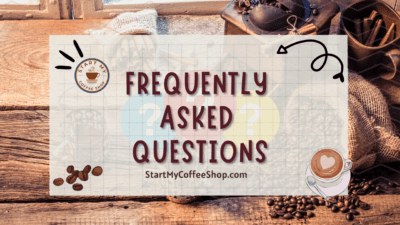
1. What are the ongoing operational expenses of running a coffee shop?
Operational expenses include utilities (electricity, water, gas), insurance, cleaning supplies, equipment maintenance, staff wages, inventory replenishment, and marketing.
2. Are there any specific permits or licenses required to open a coffee shop?
Yes, opening a coffee shop usually requires obtaining various permits and licenses. These may include health permits, business licenses, food handling certificates, and more.
3. How can I estimate the potential profitability of a coffee shop?
Conducting a thorough market analysis and creating a detailed financial plan will help you assess the potential profitability of your coffee shop.
To learn more on how to start your own coffee shop, check out my startup documents here.
Disclaimer: The information provided by StartMyCoffeeShop.com (“The Site”) is for general informational purposes only. All information on the Site is provided in good faith. However, we make no representation or warranty of any kind, express or implied, regarding the accuracy, adequacy, validity, reliability, availability, or completeness of any information on the Site. Under no circumstance shall we have any liability to you for any loss or damage of any kind incurred as a result of the use of the Site or Reliance on any information provided on the Site. Your use of the Site and reliance on any information on the Site is solely at your own risk. This blog post is for educational purposes only and does not constitute legal advice. Please consult a legal expert to address your specific needs. Terms and Conditions. (https://startmycoffeeshop.com/terms-and-conditions/)

Hi! I’m Shawn Chun
My adventure in coffee began when I first launched my first coffee shop back in the early 2000s. I had to figure out so many things on my own and to make it worse within 2 years of opening two large corporate coffee chains moved in just blocks away from me!
As I saw smaller and even some larger coffee shops in the neighborhood slowly lose customers to these giant coffee chains and slowly close up shop, I knew that I had to start getting creative…or go out of business.
I (like you may be) knew the coffee industry well. I could make the best latte art around and the foam on my caps was the fluffiest you have ever seen. I even had the best state-of-the-art 2 group digital Nuova Simonelli machine money could buy. But I knew that these things alone would not be enough to lure customers away from the name brand established coffee shops.
Eventually, through lots of trial and error as well as perseverance and creativity I did find a way to not only survive but also thrive in the coffee/espresso industry even while those corporate coffee chains stayed put. During those years I learned to adapt and always faced new challenges. It was not always easy, however, in the end, I was the sole survivor independent coffee shop within a 10-mile radius of my location. Just two corporate coffee chains and I were left after that year. All told the corporate coffee chains took down over 15 small independent coffee shops and kiosks and I was the last one standing and thriving.
Along the years I meet others with the same passion for coffee and I quickly learned that it is not only “how good a barista is” that makes a coffee shop successful, but the business side of coffee as well.
Hence why I started this website you are on now. To provide the tools and resources for up and coming coffee shop owners to gain that vital insight and knowledge on how to start a coffee shop successfully.
Stick around, browse through my helpful blog and resources and enjoy your stay! With lots of LATTE LOVE!
Shawn

